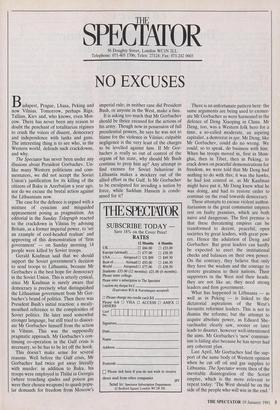SP ECTAT OR 56 Doughty Street, London WC1N 2LL
Telephone: 071-405 1706; Telex: 27124; Fax: 071-242 0603
NO EXCUSES
Budapest, Prague, Lhasa, Peking and now Vilnius. Tomorrow, perhaps Riga, Tallinn, Kiev and, who knows, even Mos- cow. There has never been any reason to doubt the penchant of totalitarian regimes to crush the voices of dissent, democracy and independence with tanks and guns. The interesting thing is to see who, in the Western world, defends such crackdowns, and why.
The Spectator has never been under any illusions about President Gorbachev. Un- like many Western politicians and com- mentators, we did not accept the Soviet Union's justification for its killing of the citizens of Baku in Azerbaijan a year ago, nor do we excuse the brutal action against the Lithuanians now.
The case for the defence is argued with a mixture of cynicism and misguided appeasement posing as pragmatism. An editorial in the Sunday Telegraph reacted to the crackdown in Vilnius by advising Britain, as a former imperial power, to 'set an example of cool-headed realism' and approving of this demonstration of 'firm government' — on Sunday morning 14 people were killed by Soviet troops.
Gerald Kaufman said that we should support the Soviet government's decision to send troops to Lithuania, because Mr Gorbachev is the best hope for democracy in the Soviet Union. This is utterly cynical, since Mr Kaufman is surely aware that democracy is precisely what distinguished the Lithuanian government from Mr Gor- bachev's brand of politics. Then there was President Bush's initial reaction: a mealy- mouthed reference to the complexities of Soviet politics. He later used somewhat stronger language, but still tried to dissoci- ate Mr Gorbachev himself from the action in Vilnius. This was the supposedly pragmatic approach. Mr Gorbachev's con- tinuing co-operation in the Gulf crisis is necessary, so he has to be let off the hook.
This doesn't make sense for several reasons. Well before the Gulf crisis, Mr Gorbachev had twice got away literally with murder: in addition to Baku, his troops were employed in Tbilisi in Georgia (where trenching spades and poison gas were their chosen weapons) to quash popu- lar demands for freedom from Moscow's imperial rule; in neither case did President Bush, or anyone in the West, make a fuss.
It is asking too much that Mr Gorbachev should be thrice excused for the actions of his army. Though now in possession of full presidential powers, he says he was not to blame for the violence in Vilnius; culpable negligence is the very least of the charges to be levelled against him. If Mr Gor- bachev is really so out of control of the organs of his state, why should Mr Bush continue to prop him up? Any attempt to find excuses for Soviet behaviour in Lithuania makes a mockery out of the allied effort in the Gulf. Is Mr Gorbachev to be exculpated for invading a nation by force, while Saddam Hussein is conde- mned for it? There is an unfortunate pattern here: the same arguments are being used to exoner- ate Mr Gorbachev as were harnessed in the defence of Deng Xiaoping in China. Mr Deng, too, was a Western folk hero for a time, a so-called moderate, an aspiring capitalist, a democrat in spe. Mr Deng, like Mr Gorbachev, could do no wrong. We could, so to speak, do business with him. When his troops moved in, first in Shan- ghai, then in Tibet, then in Peking, to crack down on peaceful demonstrations for freedom, we were told that Mr Deng had nothing to do with this; it was the hawks, he had lost control or, as Mr Kaufman might have put it, Mr Deng knew what he was doing, and had to restore order to continue on the road towards democracy.
These attempts to excuse violent author- itarianism in the great communist empires rest on faulty premises, which are both naive and dangerous. The first premise is that these threatening empires can be transformed to decent, peaceful, open societies by great leaders, with great pow- ers. Hence the adulation of Deng and Gorbachev. But great leaders can hardly be expected to erect the institutional checks and balances on their own power. On the contrary, they believe that only they have the wisdom and the courage to restore greatness to their nations. Their supporters in the West nod their heads: they are not like us; they need strong leaders and firm government.
What has happened in Lithuania — as well as in Peking — is linked to the dictatorial . aspirations of the West's favourite reformist leaders. This is not to dismiss the reforms; but the attempt to acquire absolute power, as Eduard She- vardnadze clearly saw, sooner or later leads to disaster, however well-intentioned the aims. Mr Gorbachev's 'new' commun- ism is failing also because he has never had any coherent plan.
Last April, Mr Gorbachev had the sup- port of the same body of Western opinion when he cut off oil and gas supplies to Lithuania. The Spectator wrote then of the inevitable disintegration of the Soviet empire, which is the more relevant to repeat today: 'The West should be on the side of the people who will win in the end.'


















































 Previous page
Previous page